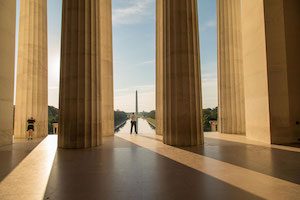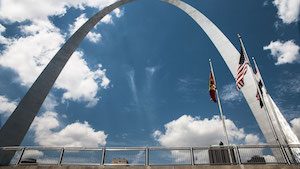Communiqué
10 Monuments That Changed America | Coming Tuesday, July 17
< < Back to 10-monuments-that-changed-america-coming-tuesday-july-17Explore the stories behind ten American monuments and the historical moments that inspired them. Visit little-known locations like the Robert Gould Shaw and Massachusetts 54th Regiment Memorial, a sculptural masterpiece dedicated to one of the first African-American units to serve in the Civil War, and learn the surprising stories behind American icons like the Statue of Liberty, which was devised as a propaganda piece by French republican politicians. It’s an episode full of epic battles fought over how to remember our past: from Maya Lin’s controversial design for the Vietnam Veterans Memorial to the ongoing controversies over Confederate monuments across the South. The episode also uncovers pivotal moments in the evolution of American monuments when daring artists found new ways to honor our history. Featured, in chronological order, are:
Bunker Hill Monument, Boston MA (1843) – One of America’s earliest monuments by architect Robert Mills, this towering obelisk honors not one “great hero” but the heroism of all who fought in the Revolutionary War, a democratic monument for a new democracy.
Statue of Liberty, New York, NY (1886) – Learn how the statue we think of as a beacon to immigrants was conceived by Frenchman Edouard Laboulaye as both a celebration of America’s democracy and a rebuke to his own nation’s autocratic rule.
Standing Soldiers, Everywhere, USA – As America came to grips with the carnage of the Civil War, monuments to both Union and Confederate soldiers were erected in thousands of towns. These mass-produced “Standing Soldiers” particularly proliferated in the South during the years of Jim Crow and continue to be a symbol of a racially divided nation and a source of controversy.
 Robert Gould Shaw and 54th Regiment Memorial, Boston, MA (1897) – In an era of racial prejudice, this monument made history by honoring one of the first African American regiments to fight in the Civil War.
Robert Gould Shaw and 54th Regiment Memorial, Boston, MA (1897) – In an era of racial prejudice, this monument made history by honoring one of the first African American regiments to fight in the Civil War.
Lincoln Memorial, Washington, DC (1922) – This iconic monument, symbolically placed directly across from the former mansion of Confederate General Robert E. Lee and built combining stone from states on both sides of the Mason-Dixon Line, would become the stage for the Civil Rights Movement and more recent protests.
Mount Rushmore, Keystone, SD (1941) – Designed as a tourist attraction, Mount Rushmore celebrated America’s expansion west; now, 70 years in the making, a new memorial to Native American leader Crazy Horse completes the state’s salute to its history.
 Gateway Arch, St. Louis, MO (1965) – Join Geoffrey for a ride to the top of Eero Saarinen’s famous arch, a memorial to Thomas Jefferson and a gateway to the West.
Gateway Arch, St. Louis, MO (1965) – Join Geoffrey for a ride to the top of Eero Saarinen’s famous arch, a memorial to Thomas Jefferson and a gateway to the West.
Vietnam Veterans Memorial, Washington, DC (1982) – Meet Jan Scruggs, the Vietnam Veteran who led the fight for a national memorial that would heal both his fellow veterans and the nation. The winner of the design competition was an unknown architecture student named Maya Lin, whose design offered an emotional and participatory way to honor the fallen.
AIDS Memorial Quilt (1987) – Meet Cleve Jones, whose San Francisco neighborhood was ground zero for the AIDS epidemic. His unorthodox idea for a massive quilt would not only honor the epidemic’s victims but also serve as a rallying cry for activists advocating for national attention to the plague.
Oklahoma City National Memorial, Oklahoma City, OK (2000) – The 1995 bombing at the Murrah Federal Building was the deadliest act of terrorism on American soil until 9/11, leaving 168 dead and more than 800 injured. Like the Vietnam Veterans Memorial, Hans and Torrey Butzer’s monument honors the dead – each with a single empty chair.

